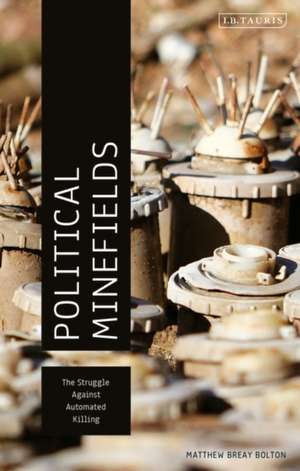Political Minefields: The Struggle against Automated Killing
Autor Matthew Breay Boltonen Limba Engleză Paperback – 19 aug 2020
| Toate formatele și edițiile | Preț | Express |
|---|---|---|
| Paperback (1) | 164.93 lei 3-5 săpt. | |
| Bloomsbury Publishing – 19 aug 2020 | 164.93 lei 3-5 săpt. | |
| Hardback (1) | 496.64 lei 6-8 săpt. | +45.25 lei 7-13 zile |
| Bloomsbury Publishing – 19 aug 2020 | 496.64 lei 6-8 săpt. | +45.25 lei 7-13 zile |
Preț: 164.93 lei
Preț vechi: 191.85 lei
-14% Nou
Puncte Express: 247
Preț estimativ în valută:
31.56€ • 32.95$ • 26.12£
31.56€ • 32.95$ • 26.12£
Carte disponibilă
Livrare economică 15-29 martie
Preluare comenzi: 021 569.72.76
Specificații
ISBN-13: 9781780761596
ISBN-10: 1780761597
Pagini: 248
Dimensiuni: 138 x 216 x 22 mm
Greutate: 0.29 kg
Editura: Bloomsbury Publishing
Colecția I.B.Tauris
Locul publicării:London, United Kingdom
ISBN-10: 1780761597
Pagini: 248
Dimensiuni: 138 x 216 x 22 mm
Greutate: 0.29 kg
Editura: Bloomsbury Publishing
Colecția I.B.Tauris
Locul publicării:London, United Kingdom
Notă biografică
Matthew
Breay
Boltonis
associate
professor
of
political
science
at
Pace
University
in
New
York
City.
He
has
participated
in
the
global
campaigns
on
landmines,
cluster
munitions,
killer
robots
and
the
arms
trade.
Since
2014,
Bolton
has
worked
on
the
UN
and
New
York
City
advocacy
of
the
International
Campaign
to
Abolish
Nuclear
Weapons
(ICAN),
recipient
of
the
2017
Nobel
Peace
Prize.
Cuprins
Foreword, Jody Williams, Chair, Nobel Women's Initiative, 1997 Nobel Peace Prize co-Laureate
1. Explosive Traps: An Introduction
2. Bombies: Automated Air War, Laos
3. Perfect Soldiers: Proxy War, Cambodia
4. Fragmentation: New War, Bosnia
5. Detritus: War on Terror, Afghanistan
6. Red Roads: Everywhere War, Sudan and South Sudan
7. Killer Robots: Digital War, USA
Survivorhood: Epilogue, United Nations
Acknowledgements
Acronyms
Notes
Index
1. Explosive Traps: An Introduction
2. Bombies: Automated Air War, Laos
3. Perfect Soldiers: Proxy War, Cambodia
4. Fragmentation: New War, Bosnia
5. Detritus: War on Terror, Afghanistan
6. Red Roads: Everywhere War, Sudan and South Sudan
7. Killer Robots: Digital War, USA
Survivorhood: Epilogue, United Nations
Acknowledgements
Acronyms
Notes
Index
Recenzii
Matthew
Bolton
documents
his
experience
working
in
humanitarian
fieldwork,
diplomatic
settings,
and
academia.
He
approaches
efforts
to
eradicate
landmines
and
tackle
other
problematic
weapons
through
the
inclusive
lens
of
human
security
as
opposed
to
more
narrowly
focused
national
security
concerns.
Bolton
examines
the
"depersonalization
of
killing"
that
has
accompanied
the
use
of
unmanned
aerial
vehicles
or
drones
and
flags
the
need
to
tackle
the
multiple
challenges
posed
by
fully
autonomous
armed
robots.
Throughout
Bolton
emphasizes
the
role
of
civil
society
to
show
how
when
ordinary
people
work
together
they
can
achieve
extraordinary
impact.
Matthew Bolton takes us on a very readable journey to what in Bosnia we used to call the Dark Side. He starts as an idealistic young aid worker and becomes almost by accident an expert on landmines and the politics of landmine clearance, which is minefield in itself. His account of unsettling experiences in Bosnia, Iraq, Afghanistan and South Sudan is a vivid snapshot of the dangerous times in which we live.
Bolton's beautifully written book portends a dehumanized future in which smart weapons stray beyond our control and lack of regulation will be our undoing. Chilling.
An interesting philosophical and personal reflection on mines and demining that shows how even the best-intentioned interventions can fall victim to local political and economic forces.
Matthew Bolton's book is well written, and very readable. Most importantly it doesn't rehash material that has been well-addressed in other books. There's an interesting balance between personal observations and substantial research, between the processes of landmine clearance and international advocacy. Local mine action people are given a voice. The book doesn't fight shy of highlighting when policy responses didn't match expectations. The segue into killer robots offers a view into the future challenges for civil society.
Matthew Bolton takes us on a very readable journey to what in Bosnia we used to call the Dark Side. He starts as an idealistic young aid worker and becomes almost by accident an expert on landmines and the politics of landmine clearance, which is minefield in itself. His account of unsettling experiences in Bosnia, Iraq, Afghanistan and South Sudan is a vivid snapshot of the dangerous times in which we live.
Bolton's beautifully written book portends a dehumanized future in which smart weapons stray beyond our control and lack of regulation will be our undoing. Chilling.
An interesting philosophical and personal reflection on mines and demining that shows how even the best-intentioned interventions can fall victim to local political and economic forces.
Matthew Bolton's book is well written, and very readable. Most importantly it doesn't rehash material that has been well-addressed in other books. There's an interesting balance between personal observations and substantial research, between the processes of landmine clearance and international advocacy. Local mine action people are given a voice. The book doesn't fight shy of highlighting when policy responses didn't match expectations. The segue into killer robots offers a view into the future challenges for civil society.
